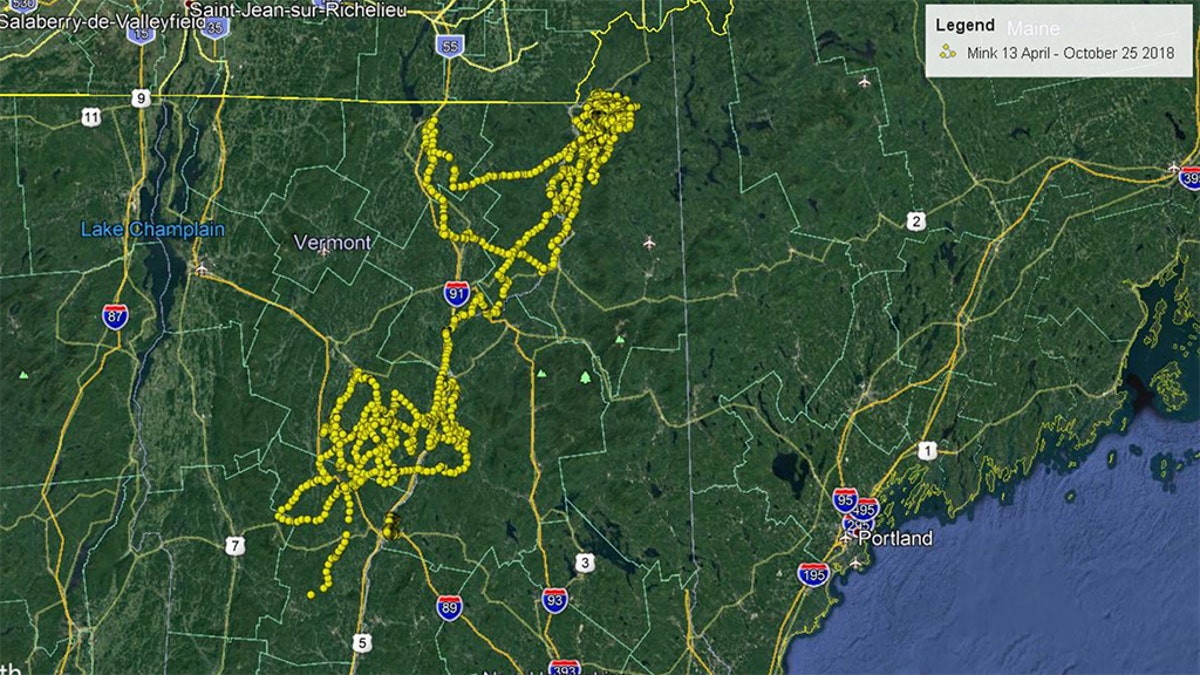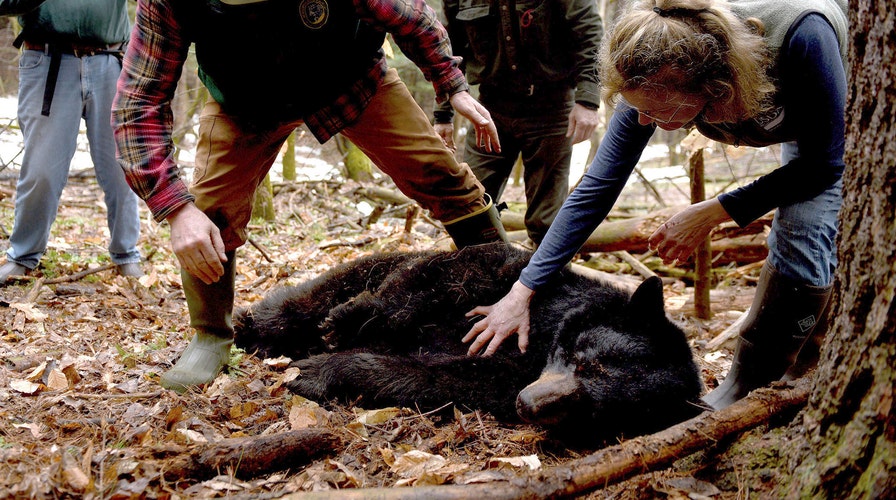Fox News Flash top headlines for May 22
Fox News Flash top headlines for May 22 are here. Check out what's clicking on Foxnews.com
A doughnut-loving bear whose life was spared by New Hampshire governor Chris Sununu two years ago has made an incredible journey home after being relocated last June.
Dubbed Mink the Bear, the animal was recently spotted on her home turf of Hanover, near Dartmouth College, after she traveled thousands of miles in an epic journey back from near the Canadian border.
The state's Fish and Game Department had decided to euthanize the female black bear and three of her young offspring in 2017 after repeated problems with them feeding on trash and bird feeders culminated with two bears entering a home in Hanover. But after a public outcry, Republican Gov. Sununu instead ordered the animals relocated.
TWO BLACK BEARS CAUGHT IN INTENSE FIGHT IN NEW JERSEY YARD
The three yearlings were moved that year, and one of them was killed by a hunter in Quebec, Canada, within a few weeks. The mother bear, dubbed "Mink" by locals, left town to mate and wasn't captured until last year after she returned with four new cubs last spring. She was tagged, fitted with a tracking collar and moved about 120 miles north to a sparsely populated location near the border with Canada.

FILE - This April 13, 2018 file photo, shows Mink the bear after she had been tranquilized in Hanover, N.H. After being fitted with a tracking collar, the bear was relocated to far northern New Hampshire. (Jennifer Hauck/The Valley News via AP, File)
Last week, Mink made it back to Hanover after traveling a looping route through New Hampshire.
The bear’s reappearance has garnered plenty of attention. NPR reports that Mink, who is comfortable around humans, had endeared herself to some of Hanover’s residents before her relocation. One elderly man, for example, fed her maple-glazed doughnuts. Other residents, however, were less enamored of the animal, prompting officials to remove her from the area.
BLACK BEAR SIGHTINGS IN VIRGINIA ON THE RISE IN LIGHT OF ACORN SHORTAGE
Mink is now something of a social media celebrity. “Can someone just set up a #GoFundMe page for this bear so she can just be fed a maple doughnut a day?,” tweeted Brian Wolfe on May 15.
Some users also voiced their concern for the bear’s welfare. “This makes me sad. I’m hoping the wildlife folks have Mink’s back,” tweeted Oceana Lizard.
There is even a Twitter account devoted to Mink. “If y'all could not shoot me that'd be great,” it tweeted on May 16, with a link to a Change.org petition entitled ‘Please Don’t Kill Mink’. The petition has racked up more than 2,400 signatures.
BLACK BEAR HIT BY ARROW MAULS HUNTER BEFORE DYING, REPORTS SAY
Andrew Timmins, the bear project leader with the New Hampshire Fish and Game Department, said Monday that he's been in regular contact with the governor's office and a local bear rehabilitator — and all agree there's no need to take further action at this time.

A map showing Mink the bear's travels. (New Hampshire Fish and Game)
"This bear has shown us where she wants to be, so let's see if we can do a better job coexisting with her by being more vigilant with food attractants," Timmins said.
"The bear is currently minding its own business and staying out of trouble west of Hanover, NH," Glenn Normandeau, executive director of the New Hampshire Fish and Game Department, told Fox News, via email. "So far as NH Fish & Game is concerned as long as she continues to behave we have no plans to take any action with regards to her. It is our hope the public will also behave and not induce her into trouble by tempting her with food, etc."
VIRGINIA WILDLIFE CENTER TAKES IN 2 BLACK BEAR CUBS AFTER MOTHER IS KILLED BY HOMEOWNER
Normandeau also noted that New Hampshire has a bear population of over 5,000 animals. "While this particular bear has developed some notoriety, it is only one of hundreds the Department deals with every year in the state," he added.
The range of the American black bear, or Ursus Americanus, covers most of the North American continent, according to the National Wildlife Federation. “They are found in Alaska, much of Canada and the contiguous United States, and extend as far south as northern Mexico,” it explains on its website. “They can live just about anywhere they can find food, but largely occur where there are trees.”
In most places across the U.S., the black bear population is stable or increasing, according to the National Park Service.
The International Union for the Conservation of Nature (IUCN) Red List also notes that the American black bear population is increasing, and classifies the species as of “least concern.”
CLICK HERE TO GET THE FOX NEWS APP
The Associated Press contributed to this article. Follow James Rogers on Twitter @jamesjrogers









































